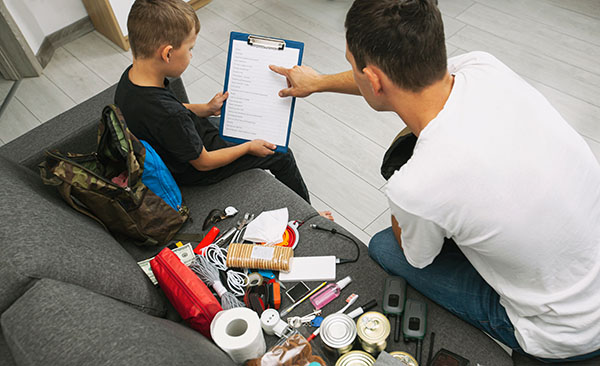
Being a productive prepper requires a lot of effort and a good work ethic. For beginners, prepping can be quite challenging because of the amount of work it takes. You might also feel pressured seeing what other preppers are doing.
But prepping doesn't have to be stressful. If you're starting to stress over what needs to be done, then you're in the spot where you need to determine how to move forward. Read on to learn about managing the mental stress of prepping.
How to manage the mental stress of prepping
Stress is a feeling of not being able to cope with specific demands or events. Stress can be a motivator and may even help you during emergencies. That's what your body's fight-or-flight mechanism is for.
But when you get triggered too easily or when you're dealing with too many stressors at once, your mental and physical health may suffer. You could end up experiencing one or more of the following symptoms, which may severely impair your ability to adequately prep for an emergency or think clearly while in the middle of one:
- Irritability
- Isolation
- Withdrawal
- Feeling numb, stunned or overwhelmed
- Feeling helpless
- Mood swings
- Sadness
- Depression
- Concentration problems
- Loss of appetite
- Headaches
- Sleep problems
- Fatigue
Thankfully, there are several ways to manage the mental stress of prepping. Here are some useful tips:
1. Follow a routine that works
Prepping is important, but it shouldn't interfere with your daily routine. The idea is to be prepared for anything that could happen, but not to the point where you feel stressed out every day. Otherwise, it would leave you feeling burnt out. To avoid this, try to get into a routine that works best for you.
For example, if you're planning to can freshly harvested fruits and vegetables, designate a specific day for that. This way, you won't stress out about canning every day of the week. If you're doing something prep-related every day, you're naturally going to feel stressed because it's all you'll be thinking about.
2. Don't overthink
Prepping involves a lot of thinking ahead, whether it's for a natural disaster like an earthquake or a full-blown terrorist attack. It's very easy to overthink when it comes to prepping.
To avoid overthinking and overdoing it, try to make a list of things you need to do. With a to-do list, you can easily keep track of everything you need to do without overwhelming yourself. Simply cross off each task on the list once you complete it.
Plus, to-do lists give you a sense of accomplishment. Crossing off tasks can motivate you to keep getting things done. Even if you don't get them all done in one day, you can look forward to doing more the next day or whenever you have spare time.
3. Prep one step at a time
Don't try to do everything on your to-do list in one go. It could kill your drive and you'll likely spend more time stressing over things instead of getting things done. Tackle your to-do list one task at a time. Start with the most straightforward tasks and work your way down to the more challenging ones.
4. Exercise
Exercise is good for both your physical and mental health. It can serve as an outlet for eliminating stress. It's a great way to start your day, too. But you don't have to hit the gym to exercise. Instead, go for a quick jog in the morning or do some yoga in your living room.
No matter what exercise you decide to do, you can expect to feel better when you're done. (Related: Yoga as complementary medicine: How yoga can support your mental and physical health.)
5. Prep with friends and loved ones
Don't be afraid to ask for help from friends and loved ones, especially if you have a lot of things to cover. You'll work better and get more things done in less time when you have a team of loved ones helping you out.
Preppers don't always talk about the mental stress that prepping can cause. If you're feeling worn out trying to get everything done, it's time to take a mental break. Work on getting into a routine, stick to a to-do list, exercise and enlist the help of your friends and family with prepping activities to minimize stress.
Preparedness.news has more articles about what you can do to make the prepping process less stressful.
Sources include:
Please contact us for more information.





















